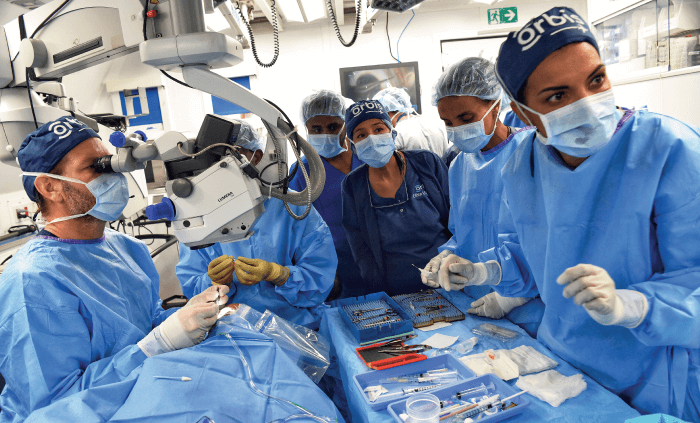
The definition of accreditation: the official recognition of someone having a particular status or being qualified to perform a particular activity.
For eye care centers around the world, accreditation demonstrates a strong commitment to excellence and continuous improvement in patient care, efficient facility operations, minimized organizational risk, disaster/security preparedness, and continuing medical education.
To Orbis, it’s especially important; we deliver training, support, and care services via teams from around the world to oft-forgotten global communities where, sometimes, even the most basic healthcare is scarcely available. The “good enough” model of charitable healthcare is not, in our opinion, good enough; each patient should receive the highest level of clinical and surgical care, no matter where in the world they live.
To that end, we sought accreditation from AAAASF (American Association for Accreditation of Ambulatory Surgery Facilities), which has since proven invaluable.
Why accredit?
The Orbis Flying Eye Hospital is the world’s only ophthalmic teaching hospital on board an MD-10 aircraft. We travel around the world to deliver skills and enhancement programs, training, education, and clinical resources to low- and middle-income countries through a network of volunteers that includes some of today’s leading ophthalmologists, anesthesiologists, nurses, and biomedical engineers.
Why did we seek AAAASF accreditation (see “Accreditation Advantages”)? In short, achieving the same standard of high-quality care for patients in our partner hospitals is a top priority and instituting accredited processes is paramount to that goal.

Closing the gaps in healthcare standards
The risks associated with not implementing proper clinical and surgical safety standards are equivalent regardless of geography – patient safety has no borders.
Today, there is significant variability among eye healthcare practices across non-accredited facilities. Utilizing a third party to benchmark, review, and supply accreditation is the best way forward to ensure adherence to evidence-based, global-standard protocols.
And, despite the diverse locations of our staff, volunteers, and partner hospitals, we have been able to deliver education and training with the help of technology. The Flying Eye Hospital has a state-of-the-art onboard operating theater as well as multichannel programs and mobile platform technology to deliver education and training and to demonstrate accreditation practices.
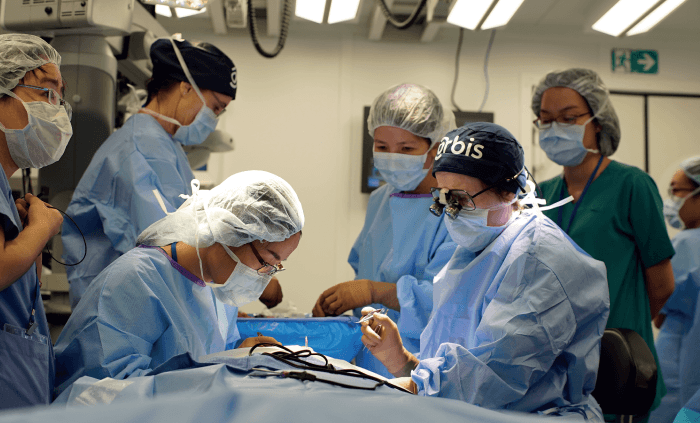
Mindset, modeling, monitoring
Having a third-party assessor, like AAAASF, review and accredit our clinical and surgical programs gives us the confidence that Orbis teams can replicate critical tasks when we work with our host-country partners.
When a partner enrolls in an accreditation program, we initially focus our efforts on three core areas. The first is mindset: we emphasize the value of following uniform processes and the importance of understanding how staff, equipment, and standards inform quality and patient safety. This is particularly important for care teams; when staff members adhere to the same high-quality standards for each task, it creates a consistency that breeds quality and accountability and reduces the risk to patient safety. Team training is critical in supporting the proper mindset.
Second, role-modeling proper processes when working directly with our in-country host partners is critical for Orbis training programs. Accreditation drives consistency and focuses on quality and, importantly, standardization helps overcome assumptions and potential miscommunications among our staff and between our volunteer faculty and host-country partners.
Finally, it is important for partners to understand the value of documentation, benchmarking, and tracking. Surgical logs, instrument sterilization logs, consumable tracking, and so on, leave a trail of data that can be easily referenced in the event questions arise about a particular case, or in the unfortunate event of an infection or other unanticipated outcomes. For example, robust documentation proves which instruments were used during a surgical case, how it was used, and the movement of that particular instrument before the surgery. Tracking the supply chain and documenting information on when medical consumables were received, when they expire, how they are stored, whether appropriate temperatures are maintained, and when they are used helps maintain clinical and surgical excellence and reduces patient risk. This level of detail can also help identify other patients who may have been exposed to a potential risk factor.
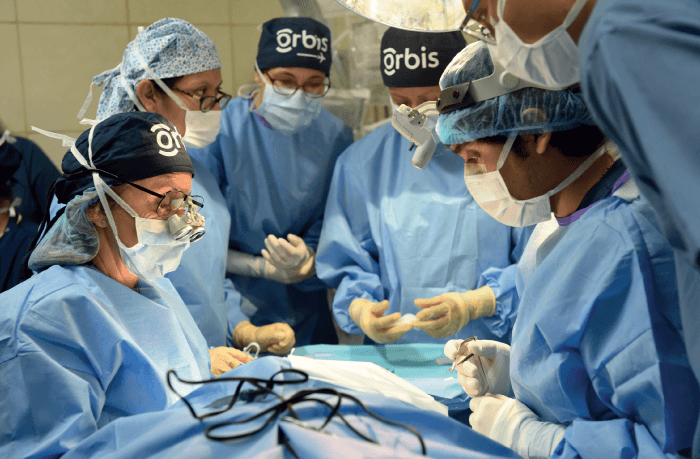
Emphasis on education
One major component of accreditation focuses on the ongoing training of staff and we’re now working closely with AAAASF on the next phase of our e-Learning offering; Cybersight (www.cybersight.org) – Orbis’ proprietary online educational portal (1).
Accreditation focuses on job-specific training, equipment use, and emergency preparedness roles, which ensures that a facility’s staff is equipped not only to treat but also to respond to an emergency and to perform their other operational functions, such as instrument processing. Given the vast geographies that we support and the diverse locations of our partner facilities, creating on-demand materials that can be accessed by the staff of a partner hospital is vitally important for us. This is the next step for us: creating lectures, forms, and standardized checklists, which will all form part of the distance learning curriculum that Orbis aims to introduce with AAAASF in the future.
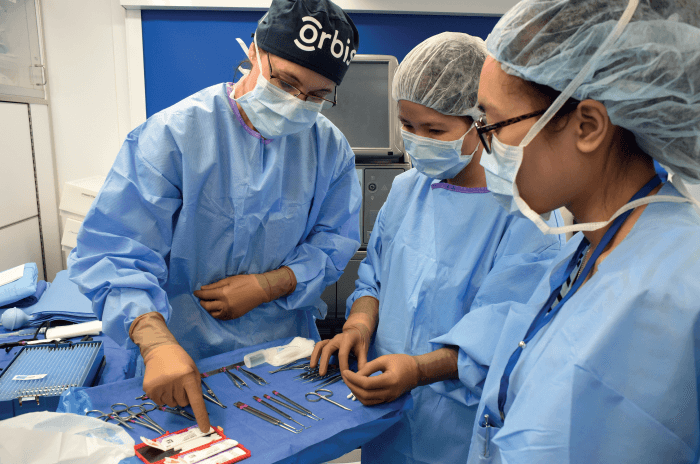
How important is it?
Not everyone is convinced of the value of accreditation, though. Is it important that the same processes and procedures are in place all over the world to protect patients? Would a universal system of standards benefit eye healthcare if all facilities used the same processes? In our opinion, absolutely! The result would be streamlined, high-level protocols and practices focused not only on individual patients but also on community care. We must encourage a continuous pursuit of clinical and surgical safety to ensure the highest possible standard of care. Most importantly, safety has to be reproducible and facility data should be collected, analyzed, and studied to ensure quality. This can only be done if we follow standardized protocols.
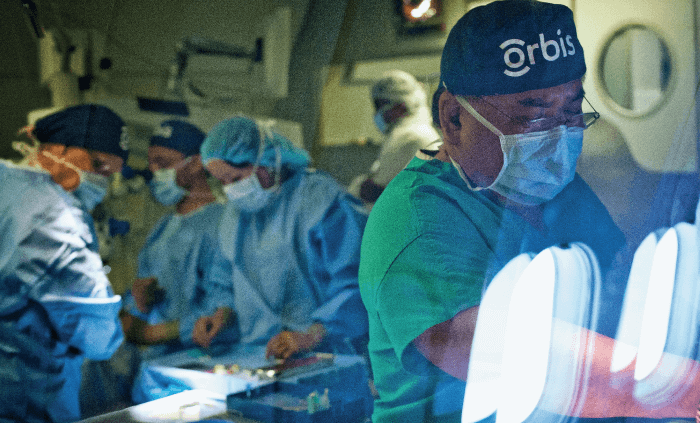
Overcoming country hurdles…
We are not naïve; we fully understand that conformity with accreditation protocols takes buy-in, time, money, and resources, some of which are in scarce supply for our partner hospitals. And there is the political landscape to navigate in host countries, too, such as lack of government or institutional mandates on a country’s healthcare system, a challenging national infrastructure, and the idea that instituting these practices will not offer an immediate return on investment when facilities are already considering budget-cutting measures.
In some parts of the world, difficult fiduciary decisions must be made to meet the demand of current health situations. Furthermore, accreditation requires institutions to review their processes with a critical eye. Annual chart reviews, surveys, and documented training programs may strain the demand for human resources. Unfortunately, this is a level of commitment that many eye health centers are simply unable or unwilling to make. However, interim advances can still be made, and all Orbis partners institute long-term action plans to integrate a high-level standard of practice mandated by accreditation.
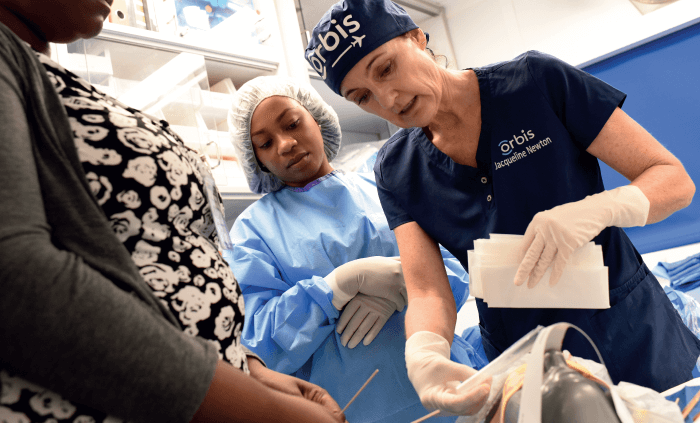
…one step at a time
Setting goals and long-term planning in cooperation with our country partners is key, and taking a step-by-step approach is often the best way to achieve this, especially when faced with country-specific barriers. This is why it is important, even if the institution is not yet seeking formal accreditation, to begin implementing accreditation-defined processes immediately.
We understand that many of our partners do not have the resources to achieve (or potentially afford) a formal accreditation, which is one reason that Orbis’ programs are so impactful. We do not overwhelm our partners with an entire accreditation structure (or process) at one time. We introduce the most critical and practical components that can be reasonably adopted. In time, we can build upon previously met goals, creating a lifelong pathway of continuing medical education, quality assurance, and safety that supports evolving systems of clinical excellence.
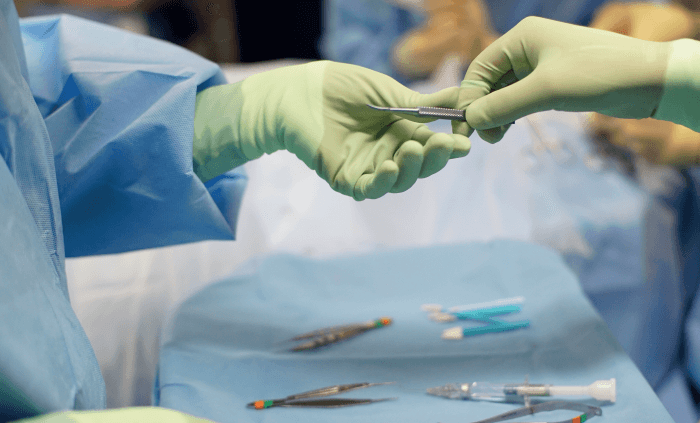
Accreditation Advantages
- A system-wide, high-level standardization of clinically relevant operations
- Consistency and continuity in patient care and safety standards
Orbis employs staff from around the world who come from different backgrounds and medical training. While all clinical staff are licensed and well-qualified, practicing one universal system of procedures is vitally important to streamline best practices in surgical and clinical care and safety standards, and crucially, it ensures practice continuity and closes any gaps that could jeopardize patient care. - Standardized operational and organizational processes, documentation, and tracking
- Protection against potential medical malpractice lawsuits
- Appropriate licensing for surgeons and clinicians in low- to middle-income host countries
- Benchmarking
In its ongoing effort to assess, benchmark, and improve patient care, AAAASF developed a quality assurance program that involves both traditional peer review and online patient safety data reporting to analyze surgical outcomes for all facilities it accredits. For the Flying Eye Hospital, this requires that we regularly submit mandatory clinical and surgical process reports, including case reviews of surgeries conducted onboard the aircraft. The AAAASF data set includes millions of patient procedures dating back to 2001, and contributes to patient safety research, journal articles, and standards revisions.
- Objectivity and independence
- In-person inspections and customized support
Orbis regularly invites surveyors from AAAASF to join our programs and work directly with Orbis staff and partners on the major areas of concern for that particular partner hospital, or ministry of health-level facility. This includes hospital walkthroughs with key personnel to review their systems and infrastructure in a non-confrontational, non-judgmental, and educational tone that yields the trust and understanding needed to implement accredited clinical and surgical standards. In many cases, adjustments needed to address gaps are no-to-low cost to implement. Sometimes it is the simplest of ideas that can greatly improve safety in a hospital setting, particularly in low- to mid-income countries.
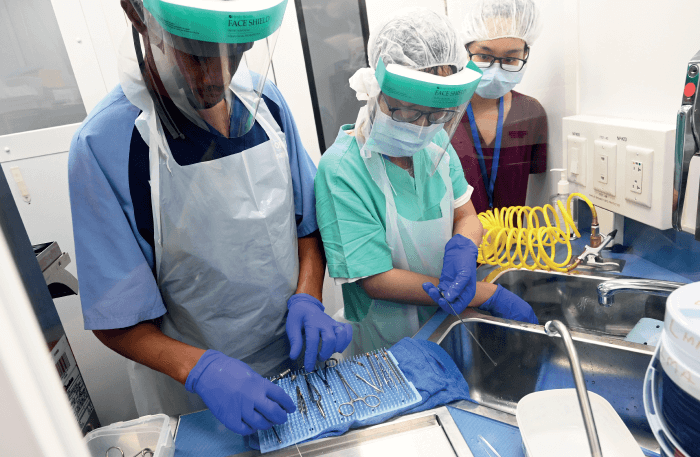
References
- A Jones, “Extended Presence,” The Ophthalmologist (2020). Available at: https://bit.ly/3c4IhCn.
